A Comprehensive Analysis of GDP and Employment: Research Report
VerifiedAdded on 2023/06/10
|7
|1296
|62
Report
AI Summary
This report presents a research analysis of the relationship between Gross Domestic Product (GDP) and employment. It utilizes Kolb's Reflective Model, detailing the stages of concrete experience, reflective observation, abstract conceptualization, and active experimentation to understand the learning process. The study also employs the Onion Methodology, exploring the layers of research philosophy, approach, strategies, method choices, time horizons, and data analysis. The research adopts a positivism philosophy, a deductive approach, and experimental research strategies. Longitudinal time horizons are used for data collection and analysis. The conclusion emphasizes the utility of research tools in knowledge development and learning, highlighting the effectiveness of both Kolb's model and the Onion Methodology in guiding the research process. The report references various sources to support its findings and conclusions regarding the relationship between GDP and employment rates.
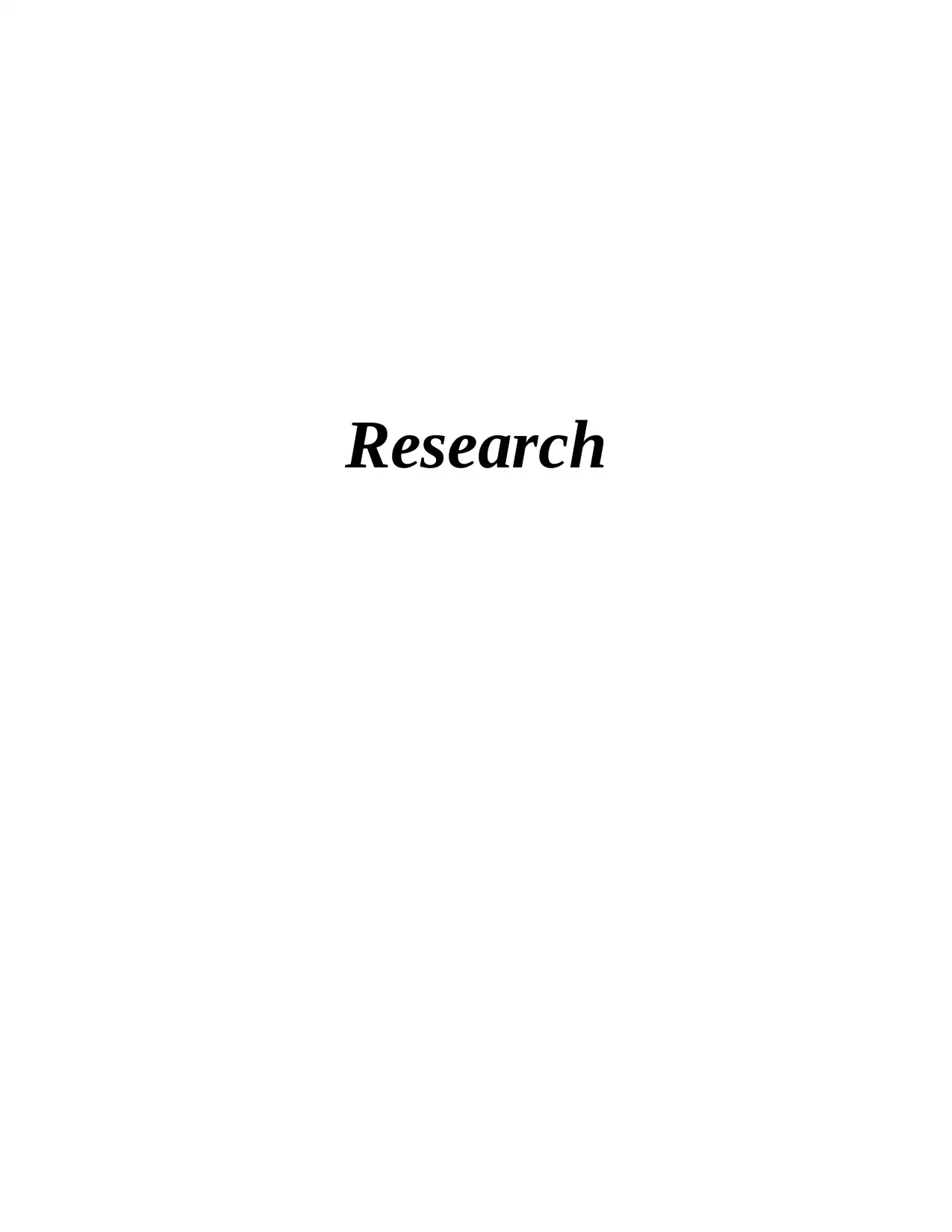
Research
Paraphrase This Document
Need a fresh take? Get an instant paraphrase of this document with our AI Paraphraser
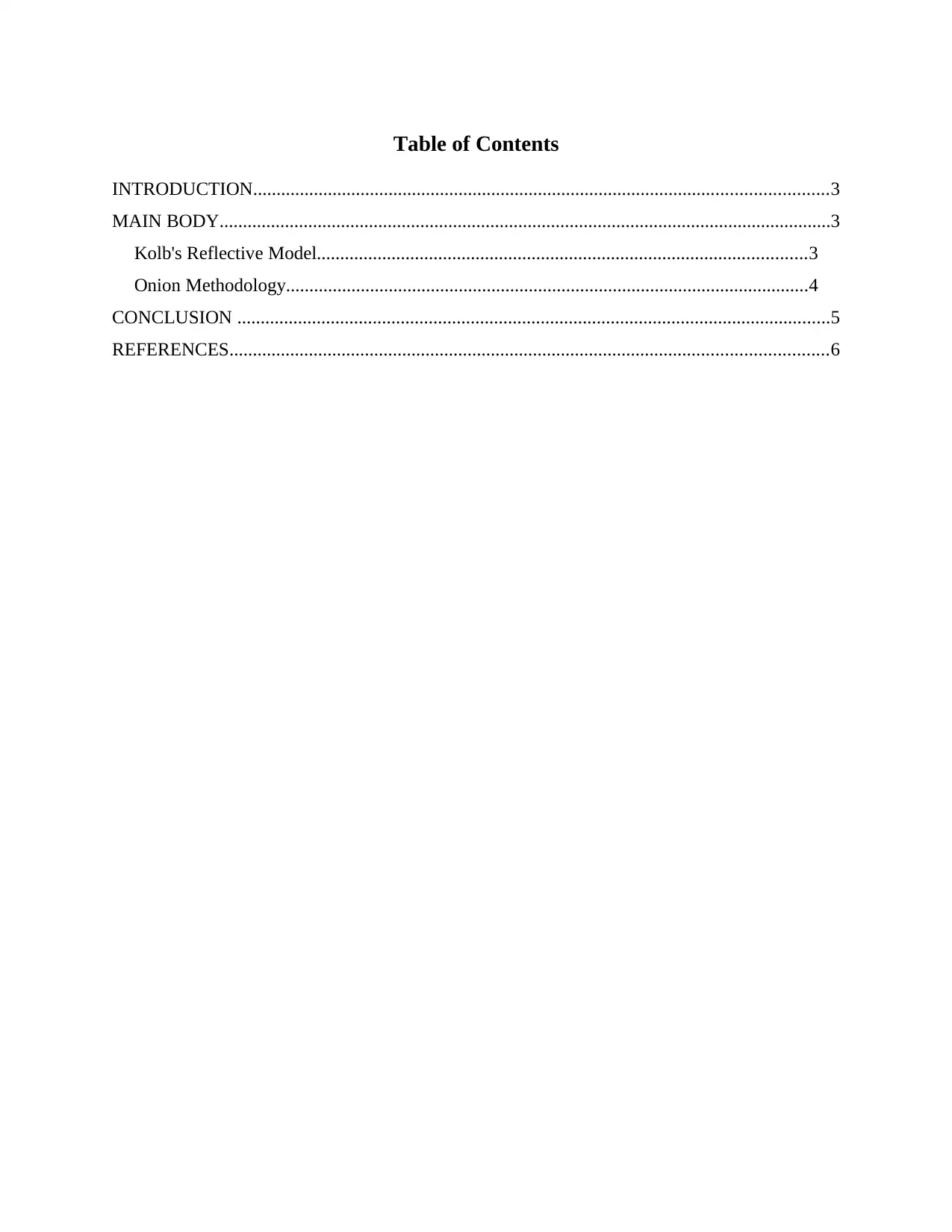
Table of Contents
INTRODUCTION...........................................................................................................................3
MAIN BODY...................................................................................................................................3
Kolb's Reflective Model.........................................................................................................3
Onion Methodology................................................................................................................4
CONCLUSION ...............................................................................................................................5
REFERENCES................................................................................................................................6
INTRODUCTION...........................................................................................................................3
MAIN BODY...................................................................................................................................3
Kolb's Reflective Model.........................................................................................................3
Onion Methodology................................................................................................................4
CONCLUSION ...............................................................................................................................5
REFERENCES................................................................................................................................6
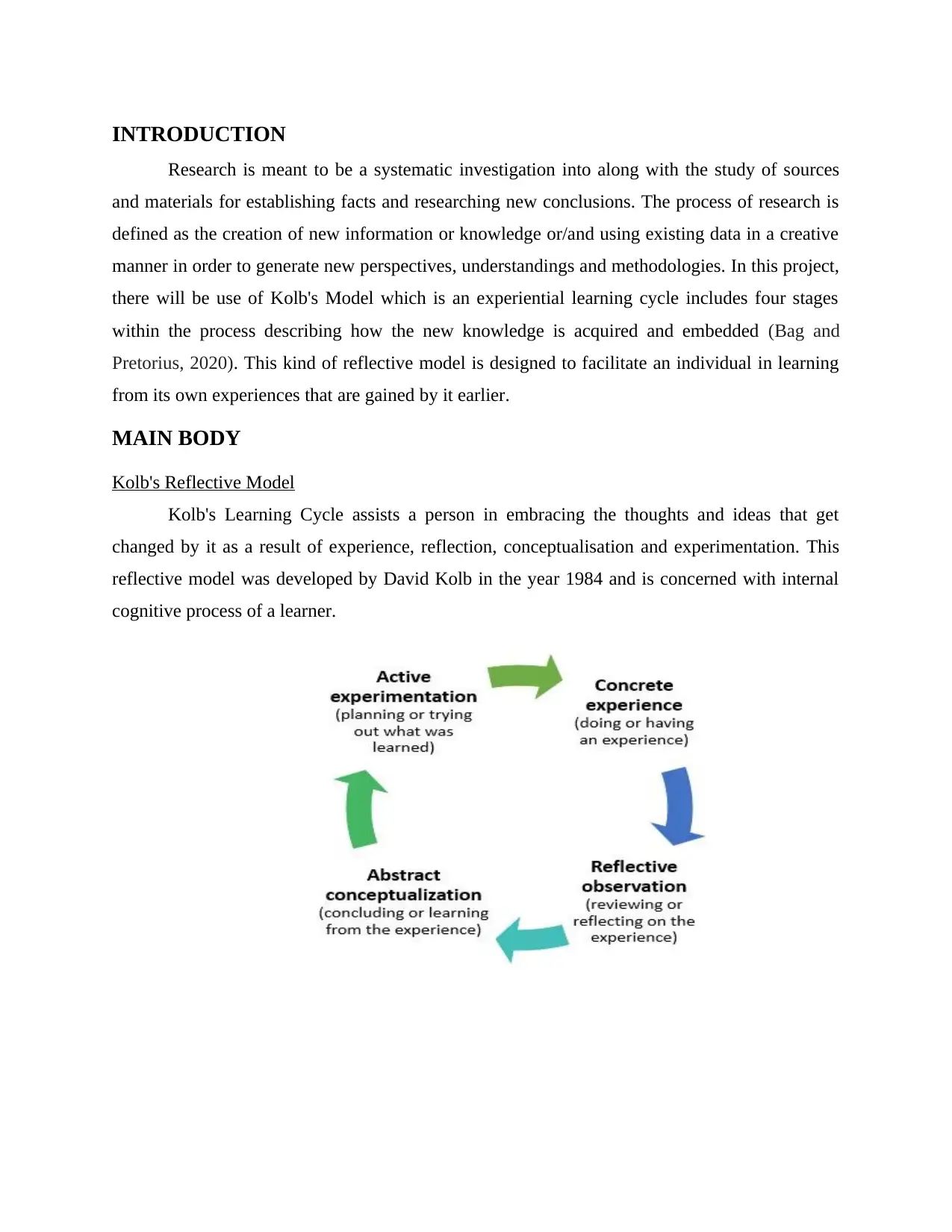
INTRODUCTION
Research is meant to be a systematic investigation into along with the study of sources
and materials for establishing facts and researching new conclusions. The process of research is
defined as the creation of new information or knowledge or/and using existing data in a creative
manner in order to generate new perspectives, understandings and methodologies. In this project,
there will be use of Kolb's Model which is an experiential learning cycle includes four stages
within the process describing how the new knowledge is acquired and embedded (Bag and
Pretorius, 2020). This kind of reflective model is designed to facilitate an individual in learning
from its own experiences that are gained by it earlier.
MAIN BODY
Kolb's Reflective Model
Kolb's Learning Cycle assists a person in embracing the thoughts and ideas that get
changed by it as a result of experience, reflection, conceptualisation and experimentation. This
reflective model was developed by David Kolb in the year 1984 and is concerned with internal
cognitive process of a learner.
Research is meant to be a systematic investigation into along with the study of sources
and materials for establishing facts and researching new conclusions. The process of research is
defined as the creation of new information or knowledge or/and using existing data in a creative
manner in order to generate new perspectives, understandings and methodologies. In this project,
there will be use of Kolb's Model which is an experiential learning cycle includes four stages
within the process describing how the new knowledge is acquired and embedded (Bag and
Pretorius, 2020). This kind of reflective model is designed to facilitate an individual in learning
from its own experiences that are gained by it earlier.
MAIN BODY
Kolb's Reflective Model
Kolb's Learning Cycle assists a person in embracing the thoughts and ideas that get
changed by it as a result of experience, reflection, conceptualisation and experimentation. This
reflective model was developed by David Kolb in the year 1984 and is concerned with internal
cognitive process of a learner.
⊘ This is a preview!⊘
Do you want full access?
Subscribe today to unlock all pages.

Trusted by 1+ million students worldwide
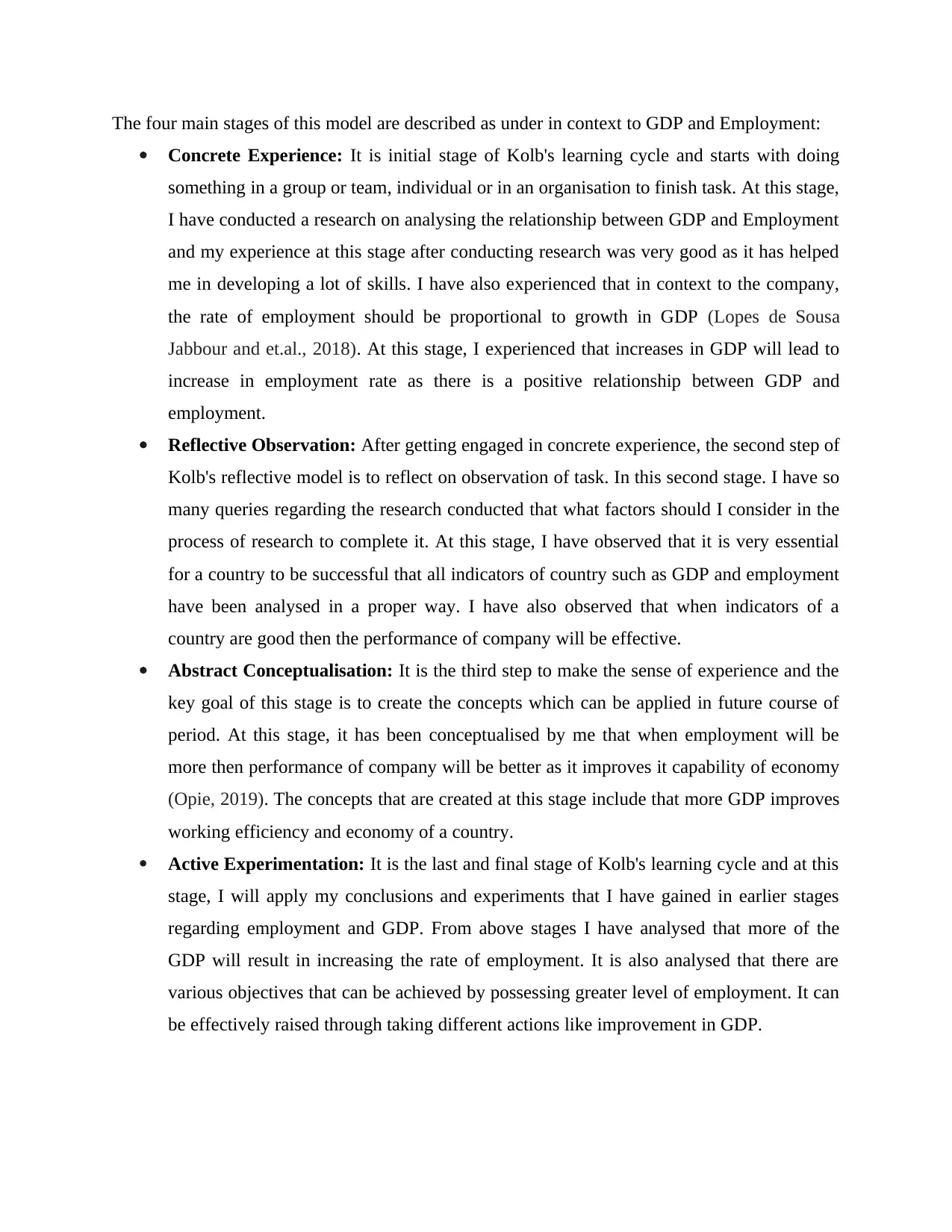
The four main stages of this model are described as under in context to GDP and Employment:
Concrete Experience: It is initial stage of Kolb's learning cycle and starts with doing
something in a group or team, individual or in an organisation to finish task. At this stage,
I have conducted a research on analysing the relationship between GDP and Employment
and my experience at this stage after conducting research was very good as it has helped
me in developing a lot of skills. I have also experienced that in context to the company,
the rate of employment should be proportional to growth in GDP (Lopes de Sousa
Jabbour and et.al., 2018). At this stage, I experienced that increases in GDP will lead to
increase in employment rate as there is a positive relationship between GDP and
employment.
Reflective Observation: After getting engaged in concrete experience, the second step of
Kolb's reflective model is to reflect on observation of task. In this second stage. I have so
many queries regarding the research conducted that what factors should I consider in the
process of research to complete it. At this stage, I have observed that it is very essential
for a country to be successful that all indicators of country such as GDP and employment
have been analysed in a proper way. I have also observed that when indicators of a
country are good then the performance of company will be effective.
Abstract Conceptualisation: It is the third step to make the sense of experience and the
key goal of this stage is to create the concepts which can be applied in future course of
period. At this stage, it has been conceptualised by me that when employment will be
more then performance of company will be better as it improves it capability of economy
(Opie, 2019). The concepts that are created at this stage include that more GDP improves
working efficiency and economy of a country.
Active Experimentation: It is the last and final stage of Kolb's learning cycle and at this
stage, I will apply my conclusions and experiments that I have gained in earlier stages
regarding employment and GDP. From above stages I have analysed that more of the
GDP will result in increasing the rate of employment. It is also analysed that there are
various objectives that can be achieved by possessing greater level of employment. It can
be effectively raised through taking different actions like improvement in GDP.
Concrete Experience: It is initial stage of Kolb's learning cycle and starts with doing
something in a group or team, individual or in an organisation to finish task. At this stage,
I have conducted a research on analysing the relationship between GDP and Employment
and my experience at this stage after conducting research was very good as it has helped
me in developing a lot of skills. I have also experienced that in context to the company,
the rate of employment should be proportional to growth in GDP (Lopes de Sousa
Jabbour and et.al., 2018). At this stage, I experienced that increases in GDP will lead to
increase in employment rate as there is a positive relationship between GDP and
employment.
Reflective Observation: After getting engaged in concrete experience, the second step of
Kolb's reflective model is to reflect on observation of task. In this second stage. I have so
many queries regarding the research conducted that what factors should I consider in the
process of research to complete it. At this stage, I have observed that it is very essential
for a country to be successful that all indicators of country such as GDP and employment
have been analysed in a proper way. I have also observed that when indicators of a
country are good then the performance of company will be effective.
Abstract Conceptualisation: It is the third step to make the sense of experience and the
key goal of this stage is to create the concepts which can be applied in future course of
period. At this stage, it has been conceptualised by me that when employment will be
more then performance of company will be better as it improves it capability of economy
(Opie, 2019). The concepts that are created at this stage include that more GDP improves
working efficiency and economy of a country.
Active Experimentation: It is the last and final stage of Kolb's learning cycle and at this
stage, I will apply my conclusions and experiments that I have gained in earlier stages
regarding employment and GDP. From above stages I have analysed that more of the
GDP will result in increasing the rate of employment. It is also analysed that there are
various objectives that can be achieved by possessing greater level of employment. It can
be effectively raised through taking different actions like improvement in GDP.
Paraphrase This Document
Need a fresh take? Get an instant paraphrase of this document with our AI Paraphraser
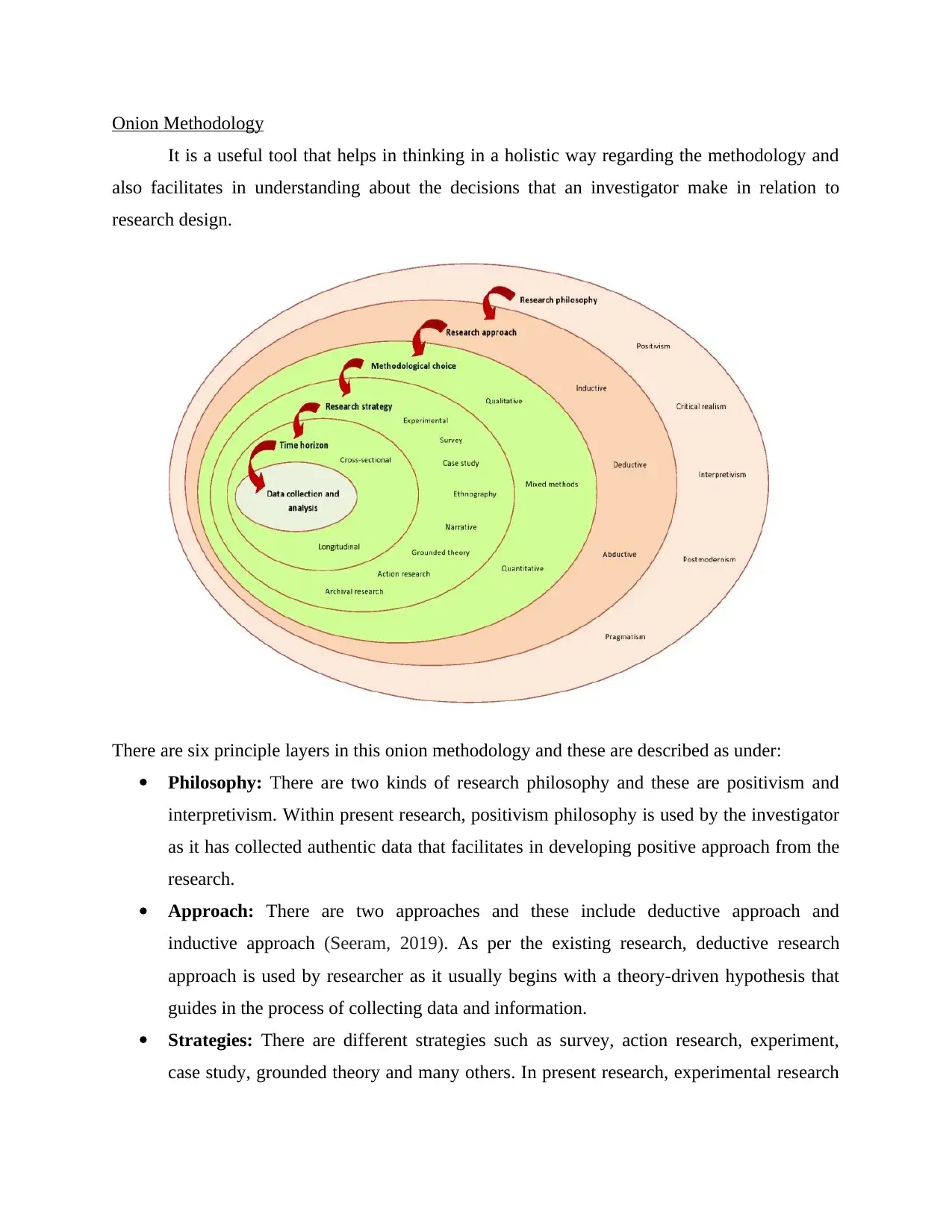
Onion Methodology
It is a useful tool that helps in thinking in a holistic way regarding the methodology and
also facilitates in understanding about the decisions that an investigator make in relation to
research design.
There are six principle layers in this onion methodology and these are described as under:
Philosophy: There are two kinds of research philosophy and these are positivism and
interpretivism. Within present research, positivism philosophy is used by the investigator
as it has collected authentic data that facilitates in developing positive approach from the
research.
Approach: There are two approaches and these include deductive approach and
inductive approach (Seeram, 2019). As per the existing research, deductive research
approach is used by researcher as it usually begins with a theory-driven hypothesis that
guides in the process of collecting data and information.
Strategies: There are different strategies such as survey, action research, experiment,
case study, grounded theory and many others. In present research, experimental research
It is a useful tool that helps in thinking in a holistic way regarding the methodology and
also facilitates in understanding about the decisions that an investigator make in relation to
research design.
There are six principle layers in this onion methodology and these are described as under:
Philosophy: There are two kinds of research philosophy and these are positivism and
interpretivism. Within present research, positivism philosophy is used by the investigator
as it has collected authentic data that facilitates in developing positive approach from the
research.
Approach: There are two approaches and these include deductive approach and
inductive approach (Seeram, 2019). As per the existing research, deductive research
approach is used by researcher as it usually begins with a theory-driven hypothesis that
guides in the process of collecting data and information.
Strategies: There are different strategies such as survey, action research, experiment,
case study, grounded theory and many others. In present research, experimental research
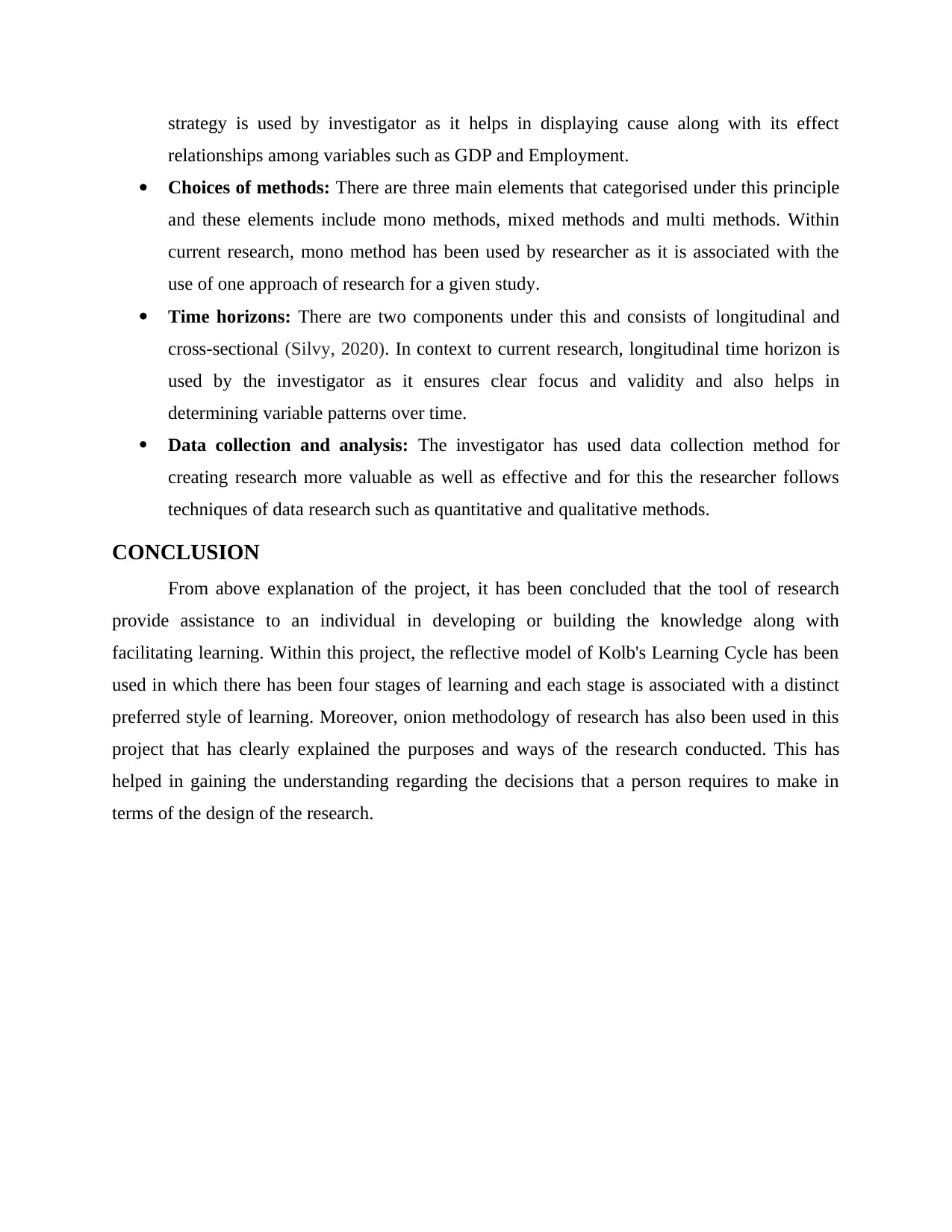
strategy is used by investigator as it helps in displaying cause along with its effect
relationships among variables such as GDP and Employment.
Choices of methods: There are three main elements that categorised under this principle
and these elements include mono methods, mixed methods and multi methods. Within
current research, mono method has been used by researcher as it is associated with the
use of one approach of research for a given study.
Time horizons: There are two components under this and consists of longitudinal and
cross-sectional (Silvy, 2020). In context to current research, longitudinal time horizon is
used by the investigator as it ensures clear focus and validity and also helps in
determining variable patterns over time.
Data collection and analysis: The investigator has used data collection method for
creating research more valuable as well as effective and for this the researcher follows
techniques of data research such as quantitative and qualitative methods.
CONCLUSION
From above explanation of the project, it has been concluded that the tool of research
provide assistance to an individual in developing or building the knowledge along with
facilitating learning. Within this project, the reflective model of Kolb's Learning Cycle has been
used in which there has been four stages of learning and each stage is associated with a distinct
preferred style of learning. Moreover, onion methodology of research has also been used in this
project that has clearly explained the purposes and ways of the research conducted. This has
helped in gaining the understanding regarding the decisions that a person requires to make in
terms of the design of the research.
relationships among variables such as GDP and Employment.
Choices of methods: There are three main elements that categorised under this principle
and these elements include mono methods, mixed methods and multi methods. Within
current research, mono method has been used by researcher as it is associated with the
use of one approach of research for a given study.
Time horizons: There are two components under this and consists of longitudinal and
cross-sectional (Silvy, 2020). In context to current research, longitudinal time horizon is
used by the investigator as it ensures clear focus and validity and also helps in
determining variable patterns over time.
Data collection and analysis: The investigator has used data collection method for
creating research more valuable as well as effective and for this the researcher follows
techniques of data research such as quantitative and qualitative methods.
CONCLUSION
From above explanation of the project, it has been concluded that the tool of research
provide assistance to an individual in developing or building the knowledge along with
facilitating learning. Within this project, the reflective model of Kolb's Learning Cycle has been
used in which there has been four stages of learning and each stage is associated with a distinct
preferred style of learning. Moreover, onion methodology of research has also been used in this
project that has clearly explained the purposes and ways of the research conducted. This has
helped in gaining the understanding regarding the decisions that a person requires to make in
terms of the design of the research.
⊘ This is a preview!⊘
Do you want full access?
Subscribe today to unlock all pages.

Trusted by 1+ million students worldwide
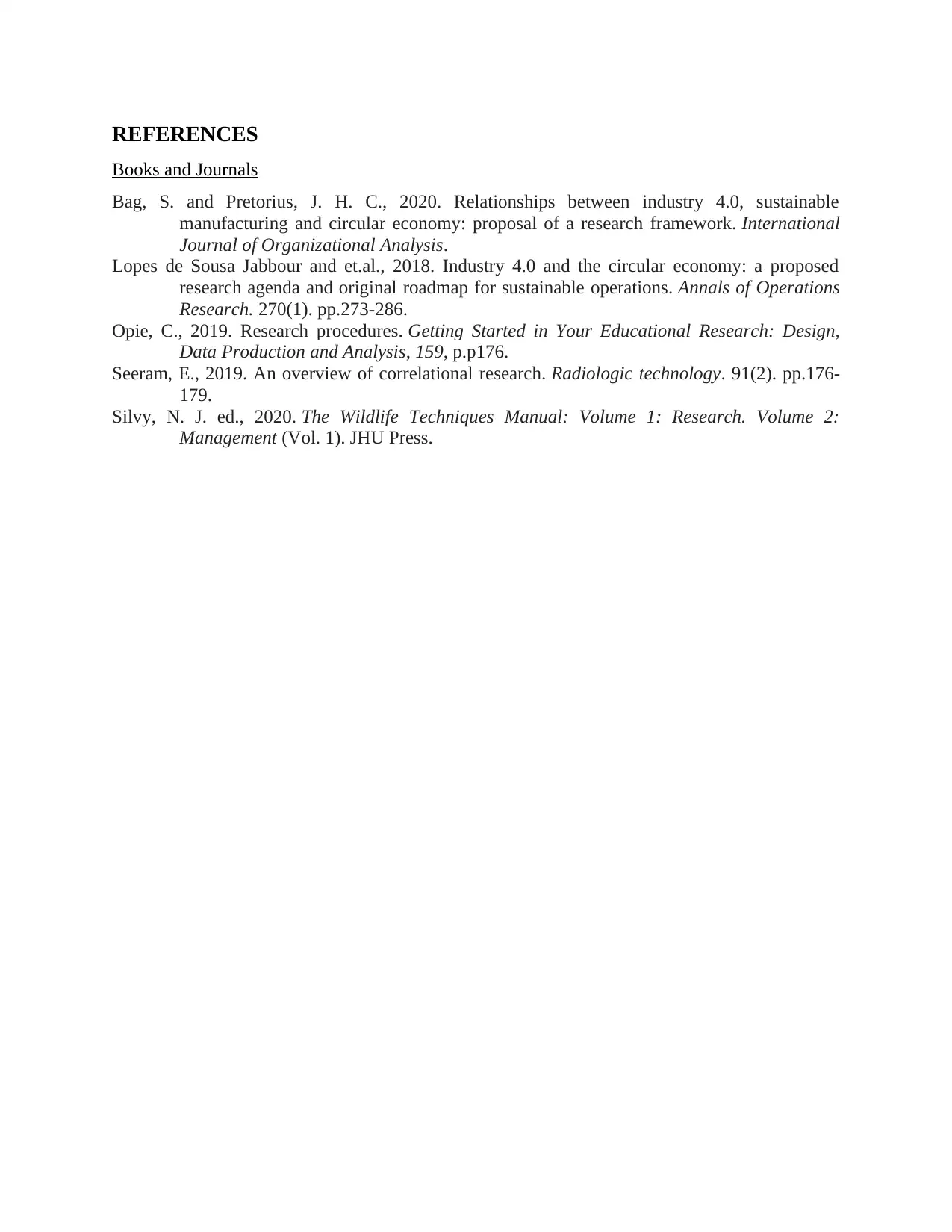
REFERENCES
Books and Journals
Bag, S. and Pretorius, J. H. C., 2020. Relationships between industry 4.0, sustainable
manufacturing and circular economy: proposal of a research framework. International
Journal of Organizational Analysis.
Lopes de Sousa Jabbour and et.al., 2018. Industry 4.0 and the circular economy: a proposed
research agenda and original roadmap for sustainable operations. Annals of Operations
Research. 270(1). pp.273-286.
Opie, C., 2019. Research procedures. Getting Started in Your Educational Research: Design,
Data Production and Analysis, 159, p.p176.
Seeram, E., 2019. An overview of correlational research. Radiologic technology. 91(2). pp.176-
179.
Silvy, N. J. ed., 2020. The Wildlife Techniques Manual: Volume 1: Research. Volume 2:
Management (Vol. 1). JHU Press.
Books and Journals
Bag, S. and Pretorius, J. H. C., 2020. Relationships between industry 4.0, sustainable
manufacturing and circular economy: proposal of a research framework. International
Journal of Organizational Analysis.
Lopes de Sousa Jabbour and et.al., 2018. Industry 4.0 and the circular economy: a proposed
research agenda and original roadmap for sustainable operations. Annals of Operations
Research. 270(1). pp.273-286.
Opie, C., 2019. Research procedures. Getting Started in Your Educational Research: Design,
Data Production and Analysis, 159, p.p176.
Seeram, E., 2019. An overview of correlational research. Radiologic technology. 91(2). pp.176-
179.
Silvy, N. J. ed., 2020. The Wildlife Techniques Manual: Volume 1: Research. Volume 2:
Management (Vol. 1). JHU Press.
1 out of 7
Related Documents
Your All-in-One AI-Powered Toolkit for Academic Success.
+13062052269
info@desklib.com
Available 24*7 on WhatsApp / Email
![[object Object]](/_next/static/media/star-bottom.7253800d.svg)
Unlock your academic potential
Copyright © 2020–2025 A2Z Services. All Rights Reserved. Developed and managed by ZUCOL.





